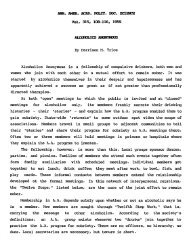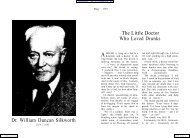NOTES ON CHAPTER 1. UNDENIABLE FACTS<strong>The</strong> God <strong>of</strong> power, energy, creativity and noveltyIn the Middle Ages, there was a tendency to turn God into a static entity calledthe Unmoved Mover, which attracted all <strong>of</strong> reality towards it as a distant ideal goal.We see this kind <strong>of</strong> concept <strong>of</strong> God coming out above all in St. Thomas Aquinas (c.1225-1274) and his First Pro<strong>of</strong> for the existence <strong>of</strong> God, the Pro<strong>of</strong> from Motion. 4<strong>The</strong> very fact that Aquinas’ God was referred to there as the Unmoved Mover gavethe basic picture better than any other words one could conjure up. This medievalGod <strong>of</strong> the philosophers was regarded as an almost completely impersonal absolute,perfect and unchanging, which was so completely transcendent that it wasfar removed from all the things <strong>of</strong> this universe, where we human beings lived ourlives.Philip Leon was part <strong>of</strong> a rebellion against that kind <strong>of</strong> concept <strong>of</strong> God whichcame to a peak during the first half <strong>of</strong> the twentieth century, and involved a number<strong>of</strong> other excellent philosophers. This rebellion began with the Boston Personalists:Borden Parker Bowne’s <strong>The</strong> Immanence <strong>of</strong> God came out in 1905, and his successorat Boston University, Edgar Sheffield Brightman, published <strong>The</strong> Problem <strong>of</strong> God in1930. <strong>The</strong> process philosophers then took up the same crusade, with Alfred NorthWhitehead’s Process and Reality (1929) and Adventures <strong>of</strong> Ideas (1933), followed by astring <strong>of</strong> books by the prolific author Charles Hartshorne: Beyond Humanism: Essaysin the New <strong>Philosophy</strong> <strong>of</strong> Nature (1937), <strong>The</strong> Divine Relativity: A Social Conception <strong>of</strong> God(1948), Philosophers Speak <strong>of</strong> God (edited with William L. Reese, 1953), and many others.Just like the Boston Personalists and the process philosophers, Leon insisted thatGod was not some rigid, impersonal, and static reality. That was certainly not thebiblical notion <strong>of</strong> God, he argued, nor the experience <strong>of</strong> the Oxford Group. <strong>The</strong>God <strong>of</strong> the Bible (and the Oxford Group) was above all a God <strong>of</strong> power and energy(in Greek, dynamis and energeia), exploding into the world and working miracleswithin the human spirit. God was the power <strong>of</strong> creativity and novelty, by which(Leon said) he meant “positive or constructive power or efficiency and not negativeor destructive and obstructive power.” Forces that were purely negative anddestructive came from a different kind <strong>of</strong> power, one which was opposed to God.[Chapter 1, section I]For Leon, this was not just a philosophical theory. It was something which couldbe felt and experienced at a meeting <strong>of</strong> the Oxford Group (A.A. people called it thespirit <strong>of</strong> the tables, while traditional Christianity called it the presence <strong>of</strong> the HolySpirit). When Leon went to his first house party at Lady Margaret Hall in Oxford,he experienced an atmosphere which was electrically charged, magnetized, and dynamic.It was filled with the spirit <strong>of</strong> the new, the uninhibited, and the fearless. Everyonehad stripped <strong>of</strong>f their masks and disguises, so that you could see who people4
truly were. <strong>The</strong>re was also a spirit <strong>of</strong> divine calm, where conflicts healed themselvesand the knots in people’s lives came untangled, and everyone present could relaxand feel true peace at last. But it was the energy and the creativity which most struckhim after the meeting had begun.God as the supreme PersonalityAlso, just like the Boston Personalists and the process philosophers, Leon stressedthat God was the supreme Personality. “In calling God personal I do not mean that Heis thought, feeling, will. He is spirit, and spirit is not thought, feeling, will, but the source<strong>of</strong> these.” All spiritual beings necessarily had to be personal beings. A being’s personalitywas the unity <strong>of</strong> its power, love, wisdom, and so on, which in turn gave rise to thatperson’s thought, feeling, and will. [chapter 1, section I]“Self ” is bad but “person” is goodIn Leon’s philosophical vocabulary, being a “person” is good, but acting in terms <strong>of</strong>“self ” (that is, being motivated by selfishness) is the root <strong>of</strong> all evil. That distinction in theway he used those two words is essential to understanding his thought. Since selfishness,Leon said, is the cause <strong>of</strong> all <strong>of</strong> our unhappiness and misery, the pursuit <strong>of</strong> the OxfordGroup’s Four Absolutes (Absolute Love, Absolute Purity, Absolute Honesty, and above all,Absolute Unselfishness) is the only real answer to the fundamental human problem.Those who know something about the history <strong>of</strong> philosophy will immediately recognizethe strong influence <strong>of</strong> Arthur Schopenhauer and his famous work Die Welt als Willeund Vorstellung (<strong>The</strong> World as Will and Representation, 1819). In Schopenhauer’s pessimisticview <strong>of</strong> the world, the will-to-life drove human beings with continual desires for goalswhich could never be attainable (to live forever, never suffer ill health, control and dominateeverything around us, and so on). Life was ultimately futile. <strong>The</strong> stronger the self,the more suffering and pain that person would end up experiencing. As the little studentjingle goes, “he who wants a gloomy hour, should spend a while with Schopenhauer.”Schopenhauer was strongly influenced by Hindu thought. He kept a copy <strong>of</strong> theHindu scriptures by his bedside, and named his pet dog Atman (the word in Hindu philosophyfor soul or life-principle). He also particularly treasured an ancient statue (coveredwith gold leaf) <strong>of</strong> Buddha dressed as a beggar. He believed that asceticism (the kind<strong>of</strong> voluntary self-sacrifice and self-denial which one sees in the life <strong>of</strong> a Buddhist monk)could bring a kind <strong>of</strong> salvation from suffering, by removing some <strong>of</strong> the pain-producingeffects <strong>of</strong> our selfish desires.One way perhaps <strong>of</strong> describing Leon’s philosophical system would be to call it aneffort to give a Judeo-Christian answer to the problem raised by Schopenhauer and thekind <strong>of</strong> Hindu and Buddhist tradition which he represented. It is important to rememberhowever, that in Leon we see not a denial <strong>of</strong> the problem, but rather an attempt to give adifferent kind <strong>of</strong> answer, one that is world-affirming instead <strong>of</strong> world-denying.5
- Page 1 and 2: The Philosophyof Courageor The Oxfo
- Page 3: fear of being creative and being ou
- Page 7 and 8: Comparison with Bill W. and A.A.on
- Page 9 and 10: I must embrace my own feeling of so
- Page 11 and 12: Alcoholism and addiction asforms of
- Page 13 and 14: specifications as to how that is to
- Page 15 and 16: perfect serenity. By shutting off a
- Page 17 and 18: The act of total surrender allows t
- Page 19 and 20: this. But you do not have to be any
- Page 21 and 22: NOTES ON CHAPTER 3. SHARING OR SPRE
- Page 23 and 24: [chapter 3, section II]If I am succ
- Page 25 and 26: NOTES ON CHAPTER 4. CHANGING SOCIET
- Page 27 and 28: The Oxford Group and Alcoholics Ano
- Page 29 and 30: view Press, 2000) 28. “Sick origi
- Page 31 and 32: INTRODUCTIONThe world is going mad,
- Page 33 and 34: TRUE RELIGIONWhy are you cowards, p
- Page 35 and 36: CONTENTSIntroductionTrue Religion31
- Page 37 and 38: to do the same for the term “pixi
- Page 39 and 40: the power which is God or from God.
- Page 41 and 42: God. The reader who is asked to con
- Page 43 and 44: these qualities and on the relation
- Page 45 and 46: y the power of God. But it is not n
- Page 47 and 48: IIMYSELFI AM NOT GODThe objection l
- Page 49 and 50: DISEASE OR FEAR: MANIAWhat is wrong
- Page 51 and 52: impurity which is denoted by the si
- Page 53 and 54: occasions when he is threatened wit
- Page 55 and 56:
IIIHEALTH OR PASSIONPURE DESIRESinc
- Page 57 and 58:
PASSION AND PARTICULAR DESIRESNot b
- Page 59 and 60:
Chapter 2DEMONSTRATION BY EXPERIMEN
- Page 61 and 62:
to desire passionately to be health
- Page 63 and 64:
Conformity with the commandment aga
- Page 65 and 66:
IITHE CRUCIAL EXPERIMENT ORTHE QUIE
- Page 67 and 68:
and hypocrisy, that judged by absol
- Page 69 and 70:
not meant; that the fool was not as
- Page 71 and 72:
hands I commit my spirit.”With th
- Page 73 and 74:
that God the Highwayman is really a
- Page 75 and 76:
I obey guidance to go and see a man
- Page 77 and 78:
foreseen or seen as I have represen
- Page 79 and 80:
AN ILLUSTRATIONBecause the checking
- Page 81 and 82:
IVTHE QUITE TIME AND THEH WORKING D
- Page 83 and 84:
NEED FOR AN ADEQUATE PSYCHOLOGY OF
- Page 85 and 86:
only to poets. But to judge from on
- Page 87 and 88:
For the first time passion or the r
- Page 89 and 90:
HEAVENWhat I have come to is Heaven
- Page 91 and 92:
For Heaven is now no longer a dream
- Page 93 and 94:
I am contiguous with other selves i
- Page 95 and 96:
expanses of self, seem to be experi
- Page 97 and 98:
IITHE STRATEGY OF THE LARGER SELFGO
- Page 99 and 100:
FEAR CONCEALS FEARNow the procedure
- Page 101 and 102:
exposure of the “universe.” Tru
- Page 103 and 104:
IIITHE STRATEGY AGAINST THE LARGER
- Page 105 and 106:
his own. The miracle of self-consci
- Page 107 and 108:
usiness, for government, for the na
- Page 109 and 110:
and then make him follow its course
- Page 111 and 112:
importance to the Company. However,
- Page 113 and 114:
of smugness, self-satisfaction and
- Page 115 and 116:
PREOCCUPATION WITH SYMPTOMSWhen “
- Page 117 and 118:
channel through which collective gu
- Page 119 and 120:
abyss and the area coincide. It is
- Page 121 and 122:
IVTHE ECONOMIC PROBLEMTHE ECONOMIC
- Page 123 and 124:
that need or greed, and not the cap
- Page 125 and 126:
VPOLITICAL SCIENCEUNCHANGED POLITIC
- Page 127 and 128:
it, by blaming other people instead
- Page 129 and 130:
VIPHILOSOPHY AND ARTTHE SINS OF THE
- Page 131 and 132:
For expression or projection is the
- Page 133 and 134:
DENYING THE SEPARATION BETWEEN THE
- Page 135 and 136:
which the errors are designed to pr
- Page 137 and 138:
A PERSONAL NOTEThe philosophy given
- Page 139 and 140:
the formation of sacred stereotypes















